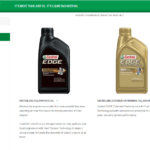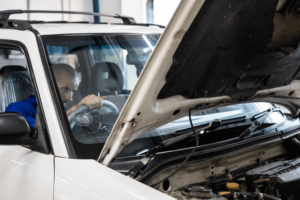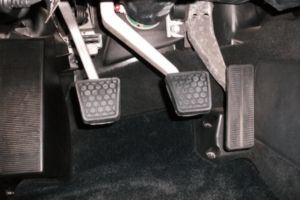Getting a new engine for your car can be a significant investment. It is not uncommon for car owners to wonder if getting a new engine is like getting a new car. While a new engine can certainly improve the performance of your car, it is not the same as buying a brand new vehicle.
A new engine can improve the overall performance of your car, but it is important to consider the age and condition of your vehicle. If your car is older and has a lot of wear and tear, simply replacing the engine may not be enough to make it feel like a new car.
Additionally, if your car has other mechanical issues, replacing the engine may not solve all of your problems.
On the other hand, if your car is relatively new and in good condition, getting a new engine can be a cost-effective way to extend the life of your vehicle. A new engine can improve fuel efficiency, power, and overall performance, making your car feel like it is brand new again.
However, it is important to weigh the cost of a new engine against the cost of a new car to determine which option is best for you.
Is Getting a New Engine Like Getting a New Car

When a car’s engine fails, it can be a frustrating and costly experience. The decision to replace the engine or purchase a new car can be a difficult one. However, getting a new engine is more economical than getting a whole new car.
Moreover, a new engine would make your car function like it’s brand new, and of course, it’d save you a lot of money.
As per JD Power, replacing an engine can cost anywhere from $1,000 to $4,000 or more depending on the make and model of the car. However, getting a new engine may be more cost-effective than buying a brand new car.
If the rest of the car is in good condition, replacing the engine can extend the life of the vehicle and save the owner a significant amount of money.
It is important to note that getting a new engine is not like getting a new car unless the only issue within your car is the engine itself.
A new engine will fix any engine issues but will not fix the underlying causes. But if you have a perfect car except for the engine, then it would make your car as good as “new.”
When considering engine replacement, it is essential to choose a reputable mechanic or repair facility. A qualified technician will be able to assess the condition of the vehicle and advise the owner on the best course of action.
It is also important to consider the warranty offered on the new engine and any other parts that may need replacement.
In conclusion, getting a new engine can be a cost-effective way to extend the life of a car. While it may not be exactly like getting a new car, it can make a significant difference in the vehicle’s performance and save the owner a considerable amount of money.
Is It Better to Replace an Engine or Get a New Car?
When faced with the decision of whether to replace an engine or buy a new car, there are a few factors to consider. The age and condition of the current car, the cost of a new engine, and the cost of a new car are all important considerations.
If the car is relatively new and in good condition, it may be more cost-effective to replace the engine rather than buying a new car. A new engine can extend the life of the car and provide reliable transportation for years to come.
However, if the car is old and in poor condition, it may not be worth investing in a new engine. In this case, it may be more practical to buy a new car.
Buying a new car has its advantages. Newer vehicles often come with updated safety features, improved fuel efficiency, and advanced technology. Additionally, buying a new car means that the owner will not have to worry about costly repairs for some time.
On the other hand, buying a new car can be expensive. The cost of a new car can range from tens of thousands of dollars to over a hundred thousand dollars. This is significantly more than the cost of a new engine or even a used car.
If cost is a major concern, it may be more practical to consider a used car. Used cars can provide reliable transportation at a fraction of the cost of a new car. However, it is important to do research and make sure that the used car is in good condition and has been well-maintained.
In conclusion, whether it is better to replace an engine or get a new car depends on the age and condition of the current car, the cost of a new engine, and the cost of a new car. It is important to carefully consider all of these factors before making a decision.
Cost Implications
When it comes to replacing an engine, cost is a significant consideration. While getting a new engine is more economical than getting a whole new car, it can still be quite expensive.
The cost of replacing an engine varies depending on the make and model of the car, the type of engine, and the mechanic doing the work.
According to ConsumerAffairs, the cost of a replacement engine can range from $800 to $2,000 for a used engine to $3,000 to $4,000 for a rebuilt engine and up to $7,000 for a new engine. However, these prices do not include the cost of labor, which can add another $500 to $1,500 to the total cost.
It’s essential to keep in mind that replacing an engine is not always the most cost-effective option. If the car is an old car with many other parts that might already be wearing off, buying a new engine without replacing these parts can turn out to be expensive in the long run.
Another consideration is taxes and fees. When buying a new car, the cost of taxes and fees can add up to a significant amount. However, when replacing an engine, these costs are usually much lower.
Overall, while getting a new engine can be expensive, it is often a more cost-effective option than buying a whole new car. It’s essential to weigh the costs and benefits of each option and determine which one is best for your budget and needs.
Maintenance and Lifespan

When it comes to getting a new engine, the lifespan of the car can be extended significantly as long as proper maintenance is conducted. Regular maintenance, such as oil changes, air filter replacements, and tune-ups, can help keep the engine running smoothly and prevent wear and tear.
It’s important to keep in mind that a new engine doesn’t necessarily mean a new car. While the engine is a crucial component, other parts of the car can still wear and require maintenance or replacement.
It’s recommended to inspect the vehicle’s transmission, brakes, and axle to ensure that they are in good condition and won’t cause issues down the line.
Maintenance costs for a new engine can vary depending on the type of engine and vehicle. However, it’s generally agreed upon that regular maintenance can help prevent costly repairs and prolong the life of the engine.
In terms of lifespan, a new engine can significantly extend the life of a vehicle, giving it the potential to last for many more years. However, it’s important to note that the lifespan of a car can also depend on factors such as driving habits, climate, and road conditions.
Overall, getting a new engine can be a wise decision if the vehicle is well-maintained and other components are in good condition. Regular maintenance can help prevent wear and tear and prolong the lifespan of the engine, ultimately saving money in the long run.
Warranty Considerations
When it comes to engine replacement, one of the most important things to consider is the warranty.
Some car manufacturers offer a warranty on their engines, which can be a major advantage for those who need a new engine. However, it is important to note that not all engine warranties are created equal.
One thing to consider is the length of the warranty. Some warranties may only last for a few months, while others can last for several years. It is important to carefully read the terms and conditions of the warranty to understand what is covered and for how long.
Another consideration is whether the warranty covers parts and labor. A warranty that only covers parts may not be as beneficial as one that covers both parts and labor.
Additionally, it is important to understand what types of repairs are covered under the warranty. Some warranties may only cover certain types of repairs, while others may cover a wide range of issues.
While a warranty can be a major advantage of getting a new engine, there are also some potential drawbacks.
For example, some warranties may require that the engine be installed by a certified mechanic or at a specific dealership. This can limit the options for where the engine can be replaced and may increase the overall cost of the repair.
Overall, the warranty is an important consideration when deciding whether to get a new engine. It is important to carefully read and understand the terms and conditions of any warranty before making a decision.
Engine Types and Their Differences

When it comes to getting a new engine, there are several options available. Each of these options has its own set of advantages and disadvantages, and it is important to understand them before making a decision.
Here are some of the most common engine types:
Used Engines
Used engines are engines that have been taken out of another vehicle and are being sold as-is. These engines are often the cheapest option, but they come with some risks. The buyer doesn’t know how the engine was treated before it was removed, and there is no guarantee that it will work properly.
Remanufactured Engines
Remanufactured engines are used engines that have been taken apart, cleaned, and rebuilt to meet the manufacturer’s specifications. These engines are often more expensive than used engines, but they come with a warranty and are generally more reliable.
Rebuilt Engines
Rebuilt engines are similar to remanufactured engines, but they are typically rebuilt by a mechanic rather than a factory. These engines are often cheaper than remanufactured engines, but they may not be as reliable.
Reconditioned Engines
Reconditioned engines are similar to remanufactured engines, but they are often rebuilt using some used parts. These engines are cheaper than remanufactured engines, but they may not be as reliable.
Brand-New Engines
Brand-new engines are engines that have never been used before. These engines are the most expensive option, but they come with a warranty and are generally the most reliable.
Each of these engine types has its own set of advantages and disadvantages. The best option will depend on the buyer’s budget, the vehicle’s make and model, and the buyer’s priorities. It is important to do research and consult with a mechanic before making a decision.
Vehicle Damage and Engine Failure
Vehicle damage can occur due to a variety of reasons such as accidents, natural disasters, and wear and tear.
One of the most common issues that can arise in a car is engine failure. As per Express Auto Service and Repair, an engine failure can occur due to several reasons, including overheating, lack of maintenance, and damage caused by accidents.
When a car engine fails, it can be a significant problem for the owner. Depending on the extent of the damage, the cost of repairing or replacing the engine can be high. In some cases, it may make more sense to replace the entire car rather than repairing or replacing the engine.
Damage to the engine can occur due to several reasons. One of the most common causes of engine damage is overheating. Overheating can occur due to several reasons, including low coolant levels, a faulty thermostat, or a damaged radiator.
If the engine overheats, it can cause significant damage to the engine, including warping of the cylinder head or engine block.
Engine failure can also occur due to lack of maintenance. Regular maintenance of the car, including oil changes, air filter replacements, and tune-ups, can help prevent engine failure. Failure to maintain the car can cause damage to the engine and other components, leading to engine failure.
In some cases, damage to the engine can be caused by accidents. Accidents can cause significant damage to the engine, including damage to the engine block, crankshaft, and other components.
If the damage is severe, it may be more cost-effective to replace the entire car rather than repairing the engine.
In conclusion, engine failure can occur due to several reasons, including overheating, lack of maintenance, and damage caused by accidents.
Depending on the extent of the damage, it may make more sense to replace the entire car rather than repairing or replacing the engine. Regular maintenance of the car can help prevent engine failure and other issues.
Inspection and Registration

When getting a new engine, it’s important to ensure that the vehicle is properly inspected and registered. In most states, a vehicle must pass an inspection before it can be registered. The inspection ensures that the vehicle is safe to drive on the road and meets emissions standards.
Inspection requirements vary by state, but typically include checks of the brakes, suspension, steering, lights, tires, and exhaust system.
Some states also require emissions testing to ensure that the vehicle meets air pollution standards. If a vehicle fails the inspection, it must be repaired before it can be registered.
In addition to passing an inspection, a vehicle must also be registered with the state. Registration fees vary by state and are typically based on the vehicle’s age, weight, and value. Some states also charge additional fees for specialty license plates or personalized plates.
It’s important to keep up with registration renewals to avoid late fees and penalties. In some states, a vehicle cannot be registered if it has not passed an inspection within the past 12 months.
If a vehicle is registered in one state but is driven in another, it may need to be inspected and registered in both states.
Overall, when getting a new engine, it’s important to ensure that the vehicle is properly inspected and registered to ensure that it is safe and legal to drive on the road.
Insurance Factors
When it comes to getting a new engine installed in a car, there are several insurance factors to consider. One of the primary concerns is whether the same insurance coverage will apply to the new engine as it did to the old one.
In most cases, the answer is yes. As long as the new engine is of the same type and size as the old one, insurance coverage should remain the same.
However, if the new engine is larger or more powerful than the old one, the insurance premium may increase.
This is because more powerful engines are typically associated with higher speeds and greater risks of accidents. As a result, insurance companies may charge higher premiums to cover the increased risk.
Another factor to consider is the age of the car. If the car is relatively new, insurance coverage for a new engine may be easier to obtain. However, if the car is older, insurance companies may be less willing to provide coverage for a new engine.
This is because older cars are typically more prone to breakdowns and may have other mechanical issues that could affect the performance of a new engine.
Look, I’ve worn a couple of hats in my time – as a mechanic and a car owner. So, here’s the scoop: before you slap a new engine into your ride, it’s a good move to chat with your insurance folks.
This way, you’ll know if there are any tweaks to your coverage or if your premiums might shimmy up a bit. It’s all about making sure you’ve got the right protection in case anything goes down on the road.
To Sum Up
In conclusion, whether getting a new engine is like getting a new car or not depends on various factors. If the car is old and has many issues aside from the engine, it may not be worth investing in a new engine.
However, if the car is in good condition and the only issue is the engine, getting a new engine can make the car function like it’s brand new.
Replacing an engine can be more economical than buying a new car, as a new engine costs around $4,000, while a new car can cost upwards of $40,000. Additionally, a car with a new engine may have better long-term reliability, as the replacement engine has less use than the original powerplant.
Before deciding to replace the engine, it’s important to consider the cost of repairs versus the cost of a new engine, driving habits, and the availability of parts. It’s also worth noting that replacing an engine will fix any engine issues but will not fix underlying causes.
In summary, getting a new engine can be a viable option for those with a car in good condition but with a faulty engine. It can save money and make the car function like it’s brand new. However, it’s important to weigh all options before making a decision.






![Is Carvana Legit? [Is It a Ripoff? Complaints, Pros and Cons] is carvana legit](https://roadsumo.com/wp-content/uploads/2022/03/is-Carvana-legit-150x150.jpg)


